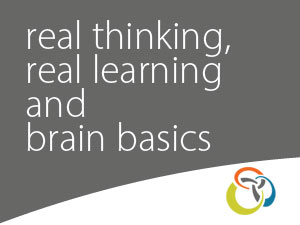real thinking, real learning and brain basics
pre-requisite
2–day foundation workshop: where thinking and learning meet™
2–day extension workshop: real thinking™ is recommended
overview
 Doctors could never do their job without understanding the body. How can learners do their job without understanding the brain? Here’s the ideal workshop to introduce YOU to brain basics, so in turn, you can introduce this critical learning to your students!
Doctors could never do their job without understanding the body. How can learners do their job without understanding the brain? Here’s the ideal workshop to introduce YOU to brain basics, so in turn, you can introduce this critical learning to your students!
But there’s more…
This intensive, hands-on workshop invites participants to examine and challenge your understanding of thinking, learning and the relationships that exist between the two, as you participate in a petite!nQuiry intoBrain Basics. By living the tools and engaging in the process themselves, you will develop their ability to design authentic learning opportunities that incorporate thinking tools and strategies, latest brain research, multiple intelligences, learning styles and student self-evaluation through an outcomes-based, transdisciplinary real learning approach!
Learn about the brain as you experience hands on, inquiry based learning opportunities using the think!nQ™ real learning process and tools from the thinkbox™ real thinking framework.
outcomes
- develop knowledge and understanding of thinking skills, strategies and tools, authentic learning process, curriculum and technology integration, curriculum planning and implementation, and assessment and evaluation
- experience outcomes-based, learning opportunities which reinforce the process of learning, integrate multiple disciplines, thinking tools and skills, ICT, and brain based research through the petite!nQuiry™ framework
- use a diversity of information organisers which strategically guide learning to desired outcomes
- explore the ways in which organisers can be framed and sequenced to meet predetermined levels of depth and breadth
- develop knowledge and understanding in the areas of brain basics as you explore the following questions:
How does the brain learn?
What is the relationship between working memory and long-term memory?
What tools and strategies can be used to promote working memory processing, long-term memory storage, retrieval and transfer?
What is the relationship between danger, stress, threat and learning?
What can kids do to reduce their physical, relational and emotional threat so that they can take more control of their learning?
What are the relationships between learning and brain waves; music; switch ons and offs; brain gym and physical activity; food and water; and memory?
How can learners use this knowledge and understanding about their brain to develop personalized learning plans?
How can multiple intelligences and learning styles be seamlessly addressed so that a learner’s modalities of strength are recognized, while his areas of struggle are also developed?
